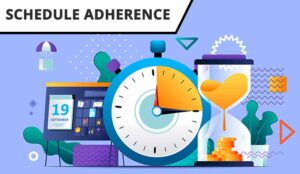Managing lateness within a contact centre can be challenging – striking the right balance between fairness to staff and maintaining consistency across departments is key.
One of our community members reached out to our network of industry professionals for insights on this:
“I have been tasked with reviewing the lateness and absence processes for our contact centre and would like to gather insights from others in the industry. We want to be fair to our staff while ensuring a managed and consistent approach across all departments.
What do other contact centres consider as ‘late’? Is it 1 minute, 5 minutes? How many instances of lateness trigger a warning? We’d love to hear what works (or doesn’t work) for others in managing lateness effectively.”
How to Manage Lateness in Your Contact Centre
Define What Counts as “Late”?
Consider a 5-Minute Window
While some contact centres implement a 5-minute grace period, lateness in an interval-based staffing model can still throw off capacity planning. From an operational standpoint, even a slight delay can affect service levels.
Contributed by: Kathleen
Is 1 Minute Really Late?
A rigid approach to lateness can sometimes backfire. There have been cases where employees won legal disputes over discrepancies in system-tracked login times. It’s crucial to ensure timekeeping methods are accurate to avoid unjust penalties.
Contributed by: Jonathan
Log Lateness for Reporting
Many workplaces log lateness from the first minute for reporting, even if no action is taken initially. A common practice is:
- 1-4 minutes late: Logged but not penalised.
- 5-15 minutes late: Subject to lateness policies, with possible corrective action.
- 15+ minutes late: Requires time to be worked back and may escalate to formal disciplinary steps.
Contributed by: Leon
Use Schedule Adherence and Workforce Management
Introduce Schedule Adherence
Encouraging schedule adherence helps maintain operational efficiency. Monitoring lateness during 1-2-1 meetings allows managers to address patterns and guide employees towards improvement.
Contributed by: Richard
Use WFM to Manage Lateness
The WFM team plays a key role in educating agents on how lateness impacts service levels. Some centres use “file notes” as informal records of lateness, with escalation after three occurrences. This structured yet educational approach helps prevent formal disciplinary action.
Contributed by: Daniel
Engage Employees in Scheduling
Instead of punitive measures, consider engaging employees in the scheduling process:
- Offer training on how scheduling and capacity planning work.
- Implement a WFM system allowing employees to swap shifts.
- Show how good adherence can open paths to leadership roles.
Contributed by: Chris
Create a Culture of Punctuality
Make Punctuality a Positive Habit
Building a culture of punctuality is more effective than enforcing strict policies. Suggestions include:
- Encouraging staff to arrive 10 minutes before shifts instead of right on time.
- Implementing quarterly rewards for consistent adherence.
- Penalising repeated lateness through stack ranking performance reviews.
- Reviewing preferred shift allocations periodically to prevent bias.
Contributed by: Nilesh
Restrict Latecomers From Preferred Shifts
To deter habitual lateness, limiting favourable shifts (e.g., morning shifts) for persistent latecomers can be effective. However, any such action should comply with local labour laws.
Contributed by: Mohamed
Use Incentives to Improve Attendance
A successful method in a 1,000-seat call centre was to link 30% of total incentives to attendance and adherence. Since it required no extra effort from employees, just punctuality, it became a highly effective motivator.
Contributed by: Salman
Conduct Awareness Sessions on Being Late
To improve punctuality, organisations can:
- Educate employees on how lateness affects customer experience (CX) and company costs.
- Log all lateness instances:
- 1-5 minutes: Address through coaching.
- 5+ minutes: Follow internal absenteeism policy.
- Offer recognition incentives (monetary or non-monetary) for 100% attendance and publicly praise employees who adhere to schedules.
- Share daily adherence reports and discuss them in weekly 1-2-1 meetings.
- Apply concepts like the “Broken Window” theory, emphasizing small improvements leading to major positive changes.
- Hold team huddles explaining adherence and absenteeism calculations.
Contributed by: Emil
Address Lateness With Employees
Understand the Reasons Behind Lateness
Before taking disciplinary action, it’s important to first understand why an employee is late. Some may have valid reasons, while others might not realise the impact of their lateness.
Leaders should engage with employees to explore their challenges, motivation, and work environment. Often, small adjustments can help resolve recurring lateness and foster a more supportive workplace.
Contributed by: Cem-Ismail & Richard
Hold Interactive Policy Discussions
To promote accountability, organisations can:
- Use employee forums to gather feedback on lateness policies.
- Conduct role-reversal exercises where employees draft lateness policies as if they were business owners – this fosters greater understanding of operational impact.
- Educate employees on why individual lateness affects the entire team.
- Ensure leaders balance empathy with accountability to maintain fairness.
Contributed by: Jo
Consider HR and Compliance Requirements
Involve HR in Setting Fair Lateness Policies
Since employment laws vary globally, HR should be involved in lateness policies to ensure compliance and fairness. Poorly implemented policies may create legal issues rather than solving attendance challenges.
Contributed by: Jim
Set Clear Limits on Lateness
Some contact centres define an allowable number of late occurrences per month before escalating actions:
- 3 instances per month – Warning issued.
- Repeated in next month – Final warning.
- Further violations – Suspension (1-7 days).
- Ongoing issues – Escalation to potential termination.
A structured approach prevents inconsistency while ensuring employees understand expectations.
Contributed by: Sheila
This article was made possible due to the great community of experts we have at Call Centre Helper, to get involved just join our LinkedIn Community and and if you aren’t already make sure you are following us on LinkedIn to see our latest content.
For more ways to manage absence in your contact centre, read these articles next:
- 46 Tips for Managing Absence
- An Action Plan for Dealing With Absenteeism
- Need to Reduce Absence in Your Contact Centre? Here’s How!
Author: Rachael Trickey
Reviewed by: Hannah Swankie
Published On: 18th Nov 2022 - Last modified: 1st Oct 2025
Read more about - Call Centre Questions, Absenteeism, Adherence, Call Centre Answers, Scheduling















